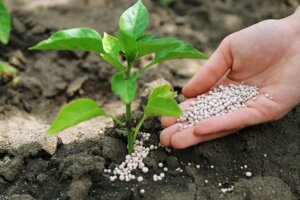Types of Fertilizers for Your Plants

Plants are different and each one has different needs, growing conditions, and care. As such, they need different types of fertilizers. Fertilizers provide plants with all the nutrients they need for their growth and maintenance, in addition to all the care that we provide.
To take care of our plants, it’s important to understand the types of fertilizers that are available so we can choose the most appropriate one. It’s also helpful to know what the differences are between them, as well as the components they have and if they’re suitable for the type of plant we have.
Understanding the types of fertilizer
Before knowing about and understanding the types of fertilizers, it’s important to know how they work. They modify the properties within the soil to make it fertile and provide the macro and micronutrients necessary for the plant to thrive.
Fertilizers according to their composition
In general, fertilizers are divided into two main types: organic and mineral. The difference is that organic fertilizer is made from natural materials such as domestic food waste. Whilst the mineral fertilizer contains nutrient and mineral compounds and is made using industrial processes.

Organic fertilizers
Organic fertilizers, as their name indicates, come from natural elements and are beneficial for the plant. Among their contents, we can highlight organic matter such as compost, manure, and peat. These can present a disadvantage in that their nutrient level isn’t as high as the other type of fertilizer.
Mineral fertilizers
This type of fertilizer is also called chemical fertilizer. These can be found in binary form (with two macronutrients) or in tertiary form (with three macronutrients). It releases what the plant needs and it comes in liquid or granulated form.
Universal fertilizers
Suitable for both indoor and outdoor plants, nitrogen is the main nutrient in universal fertilizers. This is present in all fertilizers and is essential for all types of plants. This fertilizer helps plants to become stronger and it’s available in granulated or liquid form. The latter acts faster.
Fertilizer for green plants
If you have a lot of lush, green plants in your garden, this type of fertilizer is for you. Its main characteristic helps to keep this color vivid. It also provides them with potassium and iron, which are responsible for encouraging the green color.

Fertilizer for acidophiles
In addition to hydrangeas, this type of fertilizer is used for shade-loving plants or indoor plants. This fertilizer has nutrients such as nitrogen and potassium in greater quantities, which hydrangeas need to support their love of acidic soil.
This encourages its growth, nourishes the soil, and protects the plant from any pest or disease.
Fertilizer for rose bushes
Fertilizers for rose bushes can also be used for bushes and hedges. This type of fertilizer, in addition to supplying all the nutrients that these plants need, stands out for supporting their flowering. Moreover, it also has potassium which helps maintain radiant leaf color.
Citrus fertilizer
This type of fertilizer is well known for its use on fruit trees such as lemon trees. The fertilizer is responsible for providing nutrients to the entire plant, specifically to the leaves and fruits that they have. In its extract, it has potassium and nitrogen, which are essential nutrients for any fruit to grow and mature.
Which type of fertilizer do you need for your garden?
Now that you know the types of fertilizers, it’s time for you to choose the most suitable ones to keep your garden radiant.
As you’ve realized, each plant has specific needs and requires a specific fertilizer. Although, if you don’t want to complicate things, you can just choose a universal fertilizer that’ll work for all your plants.